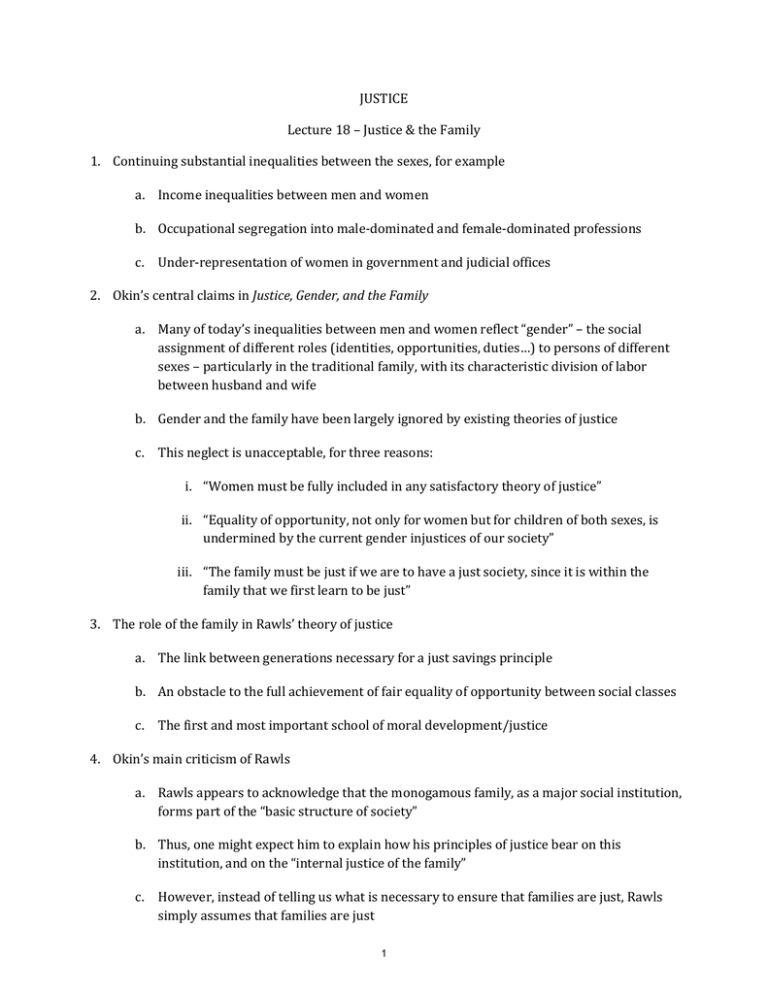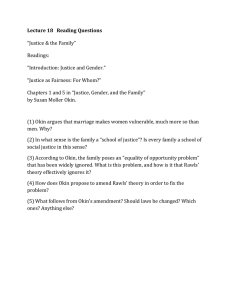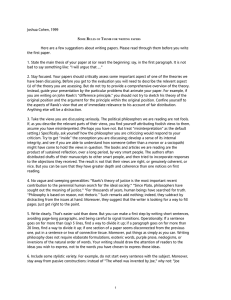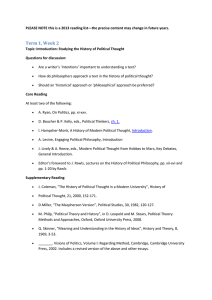JUSTICE Lecture 18 – Justice & the Family
advertisement

JUSTICE Lecture 18 – Justice & the Family 1. Continuing substantial inequalities between the sexes, for example a. Income inequalities between men and women b. Occupational segregation into male-dominated and female-dominated professions c. Under-representation of women in government and judicial offices 2. Okin’s central claims in Justice, Gender, and the Family a. Many of today’s inequalities between men and women reflect “gender” – the social assignment of different roles (identities, opportunities, duties…) to persons of different sexes – particularly in the traditional family, with its characteristic division of labor between husband and wife b. Gender and the family have been largely ignored by existing theories of justice c. This neglect is unacceptable, for three reasons: i. “Women must be fully included in any satisfactory theory of justice” ii. “Equality of opportunity, not only for women but for children of both sexes, is undermined by the current gender injustices of our society” iii. “The family must be just if we are to have a just society, since it is within the family that we first learn to be just” 3. The role of the family in Rawls’ theory of justice a. The link between generations necessary for a just savings principle b. An obstacle to the full achievement of fair equality of opportunity between social classes c. The first and most important school of moral development/justice 4. Okin’s main criticism of Rawls a. Rawls appears to acknowledge that the monogamous family, as a major social institution, forms part of the “basic structure of society” b. Thus, one might expect him to explain how his principles of justice bear on this institution, and on the “internal justice of the family” c. However, instead of telling us what is necessary to ensure that families are just, Rawls simply assumes that families are just 1 d. This leads him to neglect: (a) inequality of opportunity within the family, (b) the threat that gender poses to the family’s role as a school of justice 5. Okin nonetheless claims that Rawls’ theory has the resources to overcome these two problems a. If knowledge of sex is to be excluded by the veil of ignorance, then “we must consistently take the relevant positions of both sexes into account in formulating [selecting] and applying principles of justice” b. Okin implies that the same two principles would be selected in the Original Position, but that they should be understood to be “inconsistent with a gender-structured society and traditional family roles” i. “Rawls’ … second principle … requires that inequalities be both [1] to ‘the greatest benefit of the least advantaged’ and [2] ‘attached to positions open to all.’” ii. “This means that if any roles or positions analogous to our current sex roles— including those of husband and wife, mother and father—were to survive the demands of the first requirement, the second requirement would prohibit any linkage between these roles and sex. Gender, with its ascriptive designation of positions and expectations … in accordance with the inborn characteristic of sex, could no longer be … legitimate.” 6. Is that right? a. There should be laws to eliminate continuing gender discrimination in hiring, promotion, etc b. Social institutions should be arranged so that women are not disadvantaged simply because it is women who bear children; thus, there should be adequate paid maternity leave, among other things c. But the typical division of labor between husbands and wives—including the division of responsibilities for housework and childrearing—reflects deeply ingrained social norms rather than merely laws and formal institutions d. These social norms may well prevail even when social institutions are arranged to permit and encourage a more egalitarian division of domestic responsibilities (Consider Swedish paternity leave policy vs. uptake by fathers) e. At the same time, the Equal Basic Liberties would seem to forbid mandating a more egalitarian division of domestic responsibility f. So, can Rawls’ principles condemn all objectionable inequalities traceable to gender if principles of justice govern only the major institutions or “basic structure” of society but not the prevailing attitudes in society? Okin, Susan Moller. Justice, Gender, and the Family. Basic Books, 1991. All rights reserved. This content is excluded from our Creative Commons license. For more information, see http://ocw.mit.edu/fairuse. 2 MIT OpenCourseWare http://ocw.mit.edu 24.04J / 17.01J Justice Spring 2012 For information about citing these materials or our Terms of Use, visit: http://ocw.mit.edu/terms.



